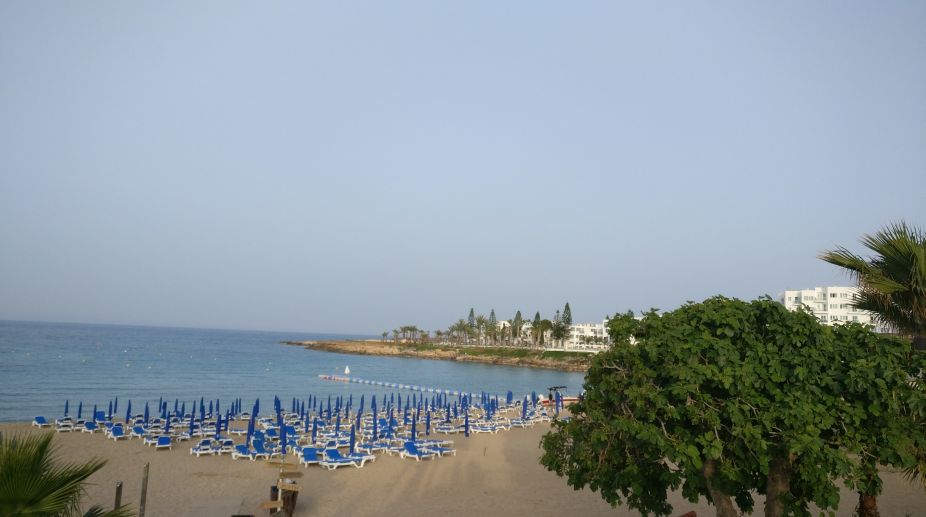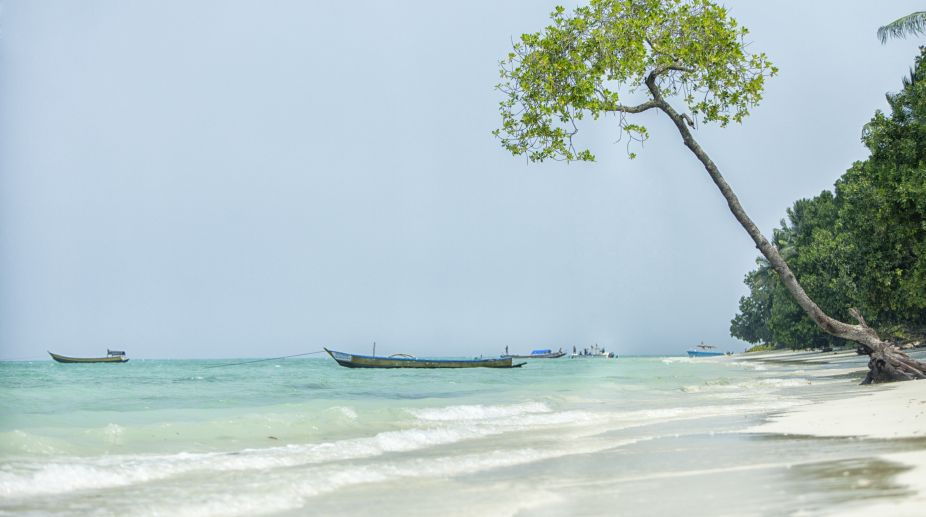India reaffirms its commitment to global pharmaceutical standardisation and regulatory convergence
India on Wednesday reaffirmed its commitment to global pharmaceutical standardisation and regulatory convergence.
India is all set to get 13 Blue Flag beaches. The accreditation is awarded by the Foundation for Environmental Education, an international organisation based in Copenhagen

A Blue Flag beach in Aiya Napa, Cyprus. (Photo: SNS)
Clean sand, crystal clear water, environment-friendly surroundings, easily accessible amenities for tourists, and safety for all visitors. Who would not like to go to a beach that offers all this? And if a beach does offer all of these, it qualifies for a Blue Flag. India has a lot of beautiful beaches but did not have any Blue Flag beach until now, which is going to change.
The Society for Integrated Coastal Management (SICOM), an environment ministry body working for the management of coastal areas, is developing 13 Indian beaches that are all set to get the Blue Flag certification on the World Environment Day on June 5. Blue Flag beaches get the certification on the basis of their water quality and the amenities they provide. These 13 will be the first Blue Flag beaches in India. In fact, two beaches in Japan, and 49 in Israel are the only Blue Flag beaches the whole of Asia can boast of. Most of the Blue Flag beaches in the world are in Europe, from where the certification programme started in 1985. The European Blue Flag became the International Blue Flag in 2001 when other beaches in other parts of the world started getting the certification.
Advertisement
Here is everything you need to know about a Blue Flag accreditation, and the eligibility criteria for a beach to get the certification.
Advertisement
What is a Blue Flag beach?
One of the most recognised eco labels in the world, the Blue Flag is awarded to beaches that meet some strict criteria with regard to water quality, facilities and safety.
The Blue Flag Programme for beaches is run by the Copenhagen-based Foundation for Environmental Education (FEE), an international non-governmental, non-profit organisation. The Blue Flag Programme aims to promote sustainable development in freshwater and marine areas, challenging local authorities to achieve high standards in the four broad categories of water quality, environmental management, environmental education and safety. The programme also awards certification to marinas and boats.

History of Blue Flag programme
The Blue Flag Programme started in France in 1985 and was implemented across Europe in 1987. South Africa joined the programme in 2001 and its horizons expanded. There are currently 45 countries in total on the Blue Flag map. While most of the nearly 4,000 Blue Flag beaches are in Europe, the others are in Africa, North America and South America, besides Asia. The country with the most blue flags is Spain, with 590 beaches, 101 marinas and five boats, followed by Greece with 535 sites in total and France with 506 beaches, marinas and boats, according to the Blue Flag Global website.
The criteria for Blue Flag accreditation
According to the Blue Flag standards, a beach has to strictly comply with 33 environment and tourism-related conditions to get the certification. All applicants need to meet the laid down criteria to receive the Blue Flag accreditation, which is decided by the national, regional and international Blue Flag juries. Besides these criteria that are imperative, or mandatory, there are some guidelines too that the programme wants all the applicants to comply with, though they are not mandatory. A national operator can choose to have stricter criteria too, in keeping with the philosophy of the Blue Flag International programme, but these must be approved by the ‘national jury’ and communicated to the ‘international jury’.
A Blue Flag beach is accessible to all — regardless of age, gender, political views and religion. A no-fee access is preferable, though Blue Flag allows some beaches, mostly private ones, to charge a “reasonable fee” from the public to let them access.
During the Blue Flag season (tourist season), the flag must fly at the beach. The flag is a symbol that the beach complies with the criteria.
Action in case of non-compliance
If a Blue Flag beach does not comply with the criteria for accreditation, the flag may be permanently or temporarily withdrawn.
In case of a ‘minor’ non-compliance, when only one criterion is violated to a small extent and can be immediately rectified, the non-compliance is registered but the flag is not withdrawn. If a minor noncompliance cannot be rectified immediately, the Blue Flag beach is given 10 days and the flag is withdrawn until the problem is rectified.
When non-compliance with two to three criteria, but of minor consequence for the health and safety of the beach user or the environment, occurs, the beach is given 10 days to comply and the flag is withdrawn until the issues are rectified and the national and international websites are updated accordingly.
When the beach does not comply with one or several criteria with major consequence for the health and safety of the beach user and the environment, the flag is withdrawn immediately and for the rest of the season.
FEE and the ‘national operator’ in a country reserve the right to refuse or withdraw accreditation if a local authority or beach operator is responsible for violations. The national operator and FEE International can pay scheduled or surprise visits to any Blue Flag beach.
Blue Flags in India
The Society for Integrated Coastal Management, under a Unified Coastal Areas Management Programme, is on a mission to make 13 of India’s beaches plastic-free and equip them with a waste management system to meet the Blue Flag certification standards. Project Head Arvind Nautiyal has said they will also have to ensure availability of clean water, amenities of international standards for tourists and be equipped with facilities for studying environmental impact around the beach.
The environment ministry started a pilot project to develop the Indian beaches according to the Blue Flag standards in December 2017.
The beaches on the list are in Odisha, Maharashtra, Puducherry, Goa, Daman and Diu, Lakshadweep and Andaman and Nicobar Islands. According to reports, Chandrabhaga beach of Odisha’s Konark coast was the first to complete the tag certification process.
Advertisement